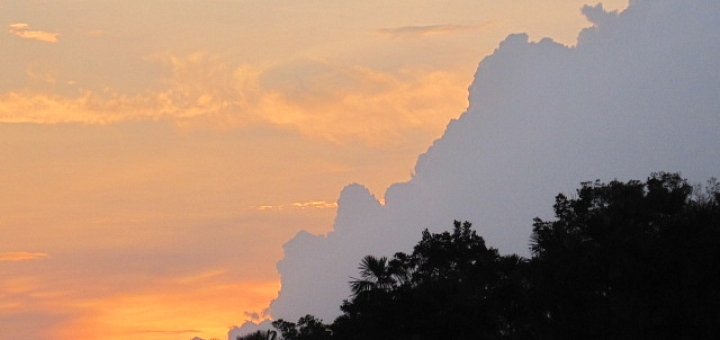I’m sitting here watching — as you are — the unfolding uprisings on the streets of six dozen American cities. And in my heart, where I used to feel things like hope, shock, excitement, outrage, dread, and determination?
I’m having a hard time feeling anything.
I admit, I’m a bit scarred. Pretty hard to spend a career in the news business and not end up at least moderately bitter and twisted, jaded and cynical. After all, short of being on the front lines as a war correspondent, I have “seen it all”. I started in the business in the thick of Watergate and the Arab Oil Embargo. I retired shortly after Alberta Official Opposition leader Danielle Smith committed the unpardonable offence of abandoning what, arguably, is the second most important office in a parliamentary democracy to lead most of her caucus across the floor to join Jim Prentice’s governing PCs and grasp briefly at the brass rail of power before the voters tossed them both out in favour of Rachel Notley and the New Democrats. In between, I:
- covered my first high school shooting at the age of 21, barely out of school myself
- won a prestigious award and a slew of commendations for a documentary on teenage suicide
- covered two nuclear near-meltdowns (Three Mile Island and Chernobyl), five recessions, two Gulf Wars, two Quebec referendums on separation, 9/11, more election campaigns than I can remember, the aftermath of a drunken premier tossing money at homeless people, the fall of the Berlin Wall and the end of the Soviet Union, three crashes in the price of oil, and three new disease outbreaks terrifying in their implications although only two are classified as pandemics — Legionnaire’s Disease, AIDS, and SARS. (H1N1 occurred while I was an MLA; my wife Martha caught it in Mexico City and it took her 5 months to fully recover from it)
- and over the decades of covering politics, business, and crime — and not always as separate issues — repeatedly witnessed the oldest sins committed in the newest kinds of ways.
The news business gave me a very dark sense of humour as a coping skill.
But wait! There’s more! (as is sometimes said in both the news business and the advertising business — which, sadly, also are not always separate issues).
My earliest memory of the world teetering on the precipice was the Cuban Missile Crisis. I had just turned 9. My father was the commanding officer of the army reserve unit in Sarnia, a circumstance which even then brought me into closer contact with current events than most people experience — which, in the case of the Cuban Missile Crisis, meant a more intimate understanding of how close we were to annihilation than a 9 year old should ever have to know. We were 60 miles from Detroit — and even if Sarnia’s Chemical Valley was somehow not a target for a direct Soviet nuclear strike, the fallout from Detroit would kill us all.
The Cuban Missile Crisis was followed, in quick succession throughout the rest of my childhood and adolescence, by the following:
- the first Kennedy assassination (John, the president, in 1963)
- the Vietnam War — oh, how my father and I argued over that, me lionizing the draft dodgers, Dad wanting to string ’em up
- the Detroit Riots (July 1967) — in fact, the Civil Rights movement had spawned growing violence in the form of pushback from white segregationists all over the southern states for a number of years by then, which in turn led to “race riots” (as they were called) in a number of big American cities in the long, hot summer of 1967. But the sweet combination of Canada’s Centennial, Expo 67, adolescence, first kiss, and first taste of independence as a summer exchange student in Quebec meant that I wasn’t paying much attention — until Detroit. Five days, 43 dead, over 300 injured, the better part of 100 square blocks burned to the ground — and a lineup of cars full of frightened white Detroiters stretching from Canada Customs back across the Bluewater Bridge and down the I-94 for thirty miles
- the assassination of Martin Luther King (April 1968) — and I have a related story that I’ll tell you in a moment or two
- the second Kennedy assassination (Bobby, the one so many of us hoped would become president, in June 1968)
- and in 1970, the October Crisis — the kidnapping of James Cross and the murder of Pierre Laporte by the FLQ, the imposition of the War Measures Act, suspension of civil liberties, and sending troops into Quebec — a Quebec I had come to know and love from having spent three successive summers there, learning another language, immersed in another culture, and learning about life.
All before my eighteenth birthday. Perhaps I was already rather scarred by the time I sought out a career in the news business.
I will confess to finding current events, policy, politics, the fate of the nation, and the state of the world weirdly more exciting, intriguing and fascinating than the average person. I will admit that I was paying much more attention to those things at a much earlier age than most people. But I think there’s another thread that ran thru it all, and that thread is hope.
The hope of a happy ending.
Somehow, somewhere in my very early childhood in a 5-channel universe (the benefit, I guess, of growing up in a border town in a time before cable — all three US networks from Detroit, an independent TV station from Windsor, and CBC from London), I got hooked on the notion that life is a series of episodes structured much like a TV show in four acts. Act One sets our story up and introduces the characters; Act Two develops the plot; Act Three sees our protagonist(s) in peril; and Act Four is the resolution, in which the good guys win, the hero gets the girl, and our story has a happy ending.
So I have approached life, my career in news, my time in elected office, the projects I’ve undertaken, the damned fool idealistic crusades (thank you for the line, Obi-wan), and the stories I’ve told with the hope of a happy ending — the fundamental belief that things will work out, that it’ll all be okay and that, if nothing else, humanity will do the right thing when it’s exhausted every other possibility (Churchill said that about the Americans).
That attitude has got me past a lot of heartache, hurdles, and naysaying. It has given me faith in the possible even when the situation has seemed to me to be impossible. And in so doing, it has led to successes that have reinforced my faith in the possible, more often than I can count.
Go back to that list of events I experienced as a too-tuned-in child and adolescent, and the list of stories and events I covered in my news and talk career. That’s witness to a lot of history — and it’s only a partial list that doesn’t include anything at all from my time in office.
Despite the fear, the danger, or the difficulty involved, I experienced and related all of those events — all of them — with the hope of a happy ending.
But now, when I read the list in the context of what’s going on today, I see that fundamentally, nothing has changed. White people are still racist as hell, still oppressing everybody non-white. Police, as militaristic today as they ever were, still serve and protect the interests of the ruling class above all else. The planet is sick, yet the only voices growing louder are the ones demanding we get the economy going again. The rich are getting richer and nobody else is getting ahead. American cities are burning again and nobody is heeding the words of the Rev. Dr. King — “the riot is the language of the unheard.”
Detroit has never recovered. That riot was 53 years ago.
I said I had a story to tell related to Dr. King’s assassination, and here it is. It came screaming back to me this morning as I read of how American officials in authority, Republicans and Democrats alike, are blaming fringe radical outsiders for coming to their cities and causing the trouble — without revealing a shred of hard evidence to support their claims:
The day after the King assassination, I found myself standing on the shore of Harsens Island at the mouth of the St. Clair River, looking across Lake St. Clair and watching two pillars of black smoke billow up from the opposite shore. This was the second Detroit riot. Smaller than the one 9 months earlier, this disturbance lasted only two days, only one person was killed, and dozens of buildings burned instead of hundreds, before then-Governor George Romney — Mitt’s father — sent in the National Guard to quell it. (Truth to tell, after 1967 there wasn’t much left standing along 12th Street in Detroit that hadn’t already been burned.)
Standing next to me was a white woman in her 40s or 50s and while I don’t want to stereotype, her hair-by-Clairol, makeup-by-Mary-Kay, and necklace-and-earring-bling-by-Sears-or-JC-Penneys marked her as a Nixonian Republican with the then-ubiquitous gold-coloured carving of an eagle mounted over the double garage door of her house somewhere in suburban or small-town Michigan far from Motown’s inner city. She looked at me and said, “You know who’s responsible for this, dontcha? The Communists. They’ve infiltrated the city and they’re stirring up the Negroes.”
My hope in a happy ending is missing. I hope I’ve just misplaced it. But I fear that it may be lost.






Leave a Reply